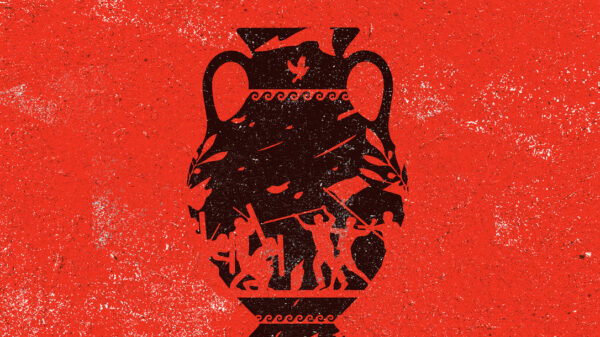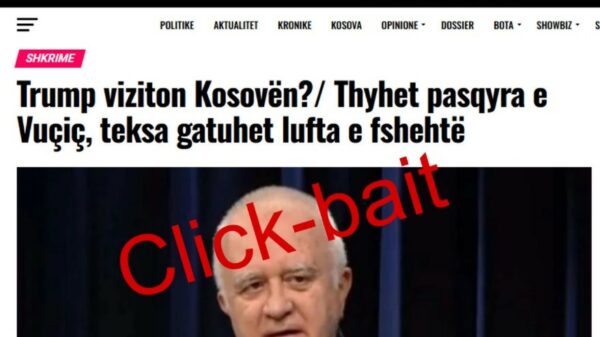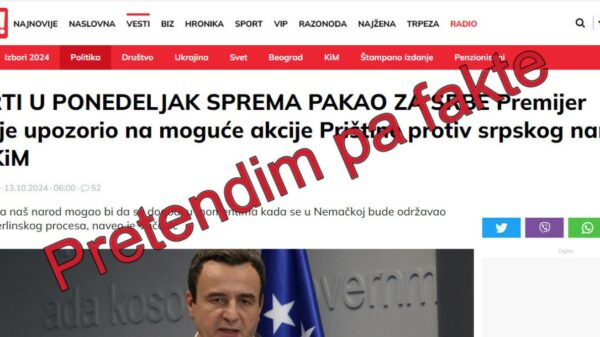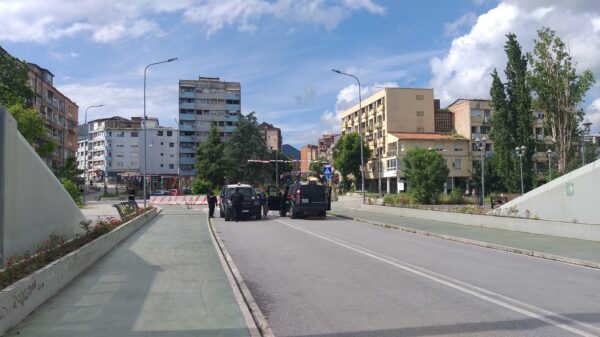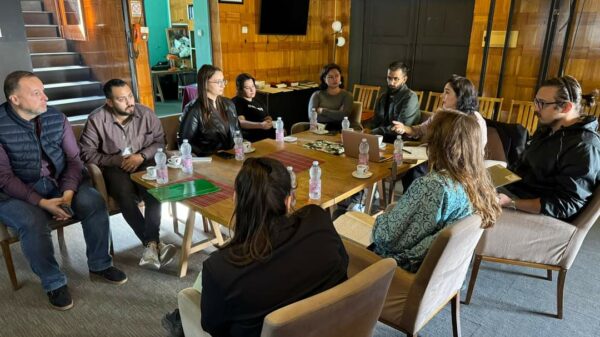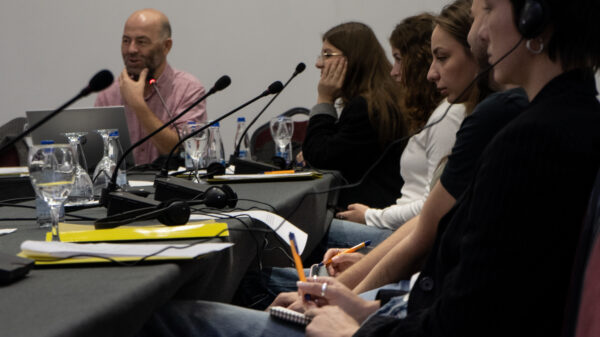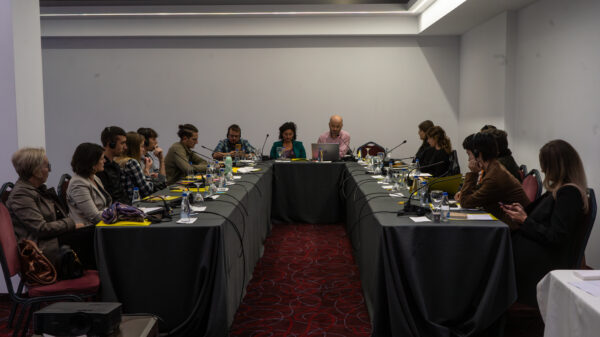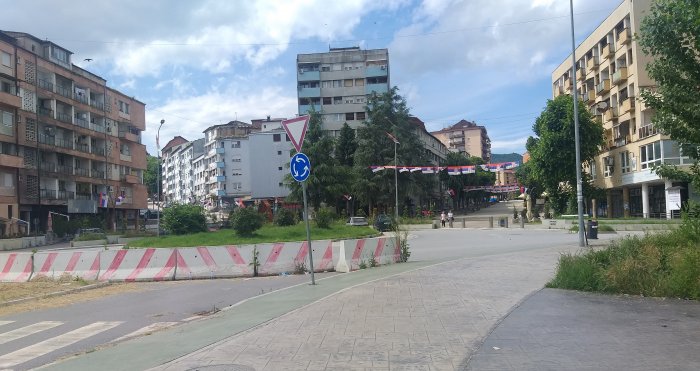Foto: Mitrovicë e Veriut
*Prepared by: Fitim Gashi
The 'Modern Plan' for the Association of Serbian Majority Municipalities, the contents of which have not yet been presented to the public, continues to fuel internal polarizations. It has been over a month since Western European emissaries brought the Draft Statute of the Association to Prishtina, which was later discussed in Brussels on the sidelines of the EU Summit and at the level of chief negotiators for Kosovo and Serbia. Although the public is not informed about the Draft, Prime Minister Albin Kurti and his deputy Besnik Bislimi have stated that they have accepted it, citing its non-disclosure due to confidentiality in negotiations. However, during the parliamentary session where they were discussing the dialogue, Kurti stated that “they have insisted on principles, and now the envoys have come with a draft statute that fully respects these principles.” He added that he has his own observations and criticisms but cannot make them public due to confidentiality. He justified the acceptance of the document by the urgency conveyed by Western European envoys, calling it a “unique opportunity”.
"If you want a package, let's do it, and I accept it as part of the package," said Kurti. In exchange for accepting the Draft, Kurti declared that he has sought from the European Union the status of candidate country and a commitment for Kosovo's membership in the NATO Partnership for Peace.
However, according to him, the problem lies with Serbia, which is refusing to sign the Euro-American proposal for the Association, along with the Basic Agreement of February 27th in Brussels and its Implementation Annex, reached in Ohrid on March 18th.
Such conditionalities with short-term benefits in other processes have so far proven unsuccessful, as the EU insists on parties focusing on fulfilling obligations without setting preconditions.
The stances expressed by other leaders after discussions on the draft statute reveal the absence of intra-institutional debate in addressing concerns about the document.
President Vjosa Osmani stated that there are issues creating ambiguity in the Draft Statute, expressing hope that they will be addressed before being submitted for interpretation to the Constitutional Court. She announced that she has prepared written comments, which have been shared with all stakeholders involved in the preparation of the draft.
Since the first agreement reached in 2013, the Association has been an obligation prescribed to Kosovo.
The request for Vučić's signature on an issue supposed to be internal to Kosovo seems perplexing unless it is being done with the intention of buying time and shifting the responsibility to the other side, knowing that he has pledged not to sign documents that reaffirm Kosovo's international subjectivity. While in opposition, Kurti and Vetëvendosja consistently accused past governments of making Serbia a stakeholder in Kosovo's internal affairs, referring to agreements from the dialogue that began as technical and ended up being political, including the one for the Association.
However, more than the signature of the other party, concerns should be raised about the powers prescribed to the Association, if the draft published by the former chief inspector of the Kosovo Intelligence Agency (KIA) is confirmed.
The 11-page draft, among the objectives it outlines for the Association, states that it “ensures a governance framework with substantial autonomy for the Serbian community in Kosovo.” Although it is mentioned that the draft does not cross Kosovo's “red lines”, it remains unclear what is meant by “substantial autonomy” for the community that already enjoys the most rights in Kosovo. References for the Association are the Agreement of April 19, 2013, as well as the principles document for the establishment of the Association of August 25, 2015. Regarding the latter, the Constitutional Court had identified violations in all seven chapters, finding problematic the powers vested in it, which reach a third level of governance.
The way the Association is being attempted to be established lacks support even from the opposition, which had previously signed agreements for the establishment of this mechanism. However, now they say that the draft they have seen raises serious concerns, as it speaks of a territorial expansion of the Serbian community and their self-governance through the Association as an instrument.
The issue of the Association has caused contradictions even within the Serbian community. The Minister for Communities and Returns, Nenad Rasiq, does not believe that the Association will solve their problems, “even though it is being presented as something significant.” He sees the integration of Serbian structures within the Association as problematic, in the sense that this mechanism lacks the capacity to bear all those employees receiving salaries from the Serbian state.
However, the director of the so-called Office for Kosovo in the Government of Serbia, Petar Petkovic, has responded to Rasiq. According to him, this is an attempt to downplay the role of the Association for Serbs, repeating that “the agreements of 2013 and 2015 foresee the continuation of the functioning of all Serbian institutions, which, unlike the current situation, will be protected under the umbrella of the ACS (Association/Community of Serb-majority Municipalities).”
Kosovo pledged to establish the Association, even though Serbia did not fully adhere to past agreements regarding parallel structures as a precondition for creating this mechanism. It has persistently refused to dissolve these structures, linking their elimination to the establishment of the Association. The Civil Protection formation, and its members, who were supposed to be fully integrated into Kosovo's institutions, have simultaneously continued illegal activities in the north, jeopardizing the country's security.
The latest agreement and its implementation annex, within which the Association of Serbian Majority Municipalities is outlined, are also not finding compliance.
The first articles of the Basic Agreement contain elements that have been interpreted as a “de facto recognition,” as Serbia commits to recognizing state symbols and not hindering Kosovo's membership in international organizations. However, during recent meetings in Brussels, on the sidelines of the EU Summit, Serbian President Aleksandar Vučić sought a rephrasing that would imply a change in the Basic Agreement. The Kosovo side did not have such requests for amending the agreement. They only responded to the request for the documents to be signed by both parties, making them valid and ready for implementation.
The need for the full implementation of the Agreement on the Normalization of Relations without delays and preconditions has been reiterated by the EU mediator for the Kosovo-Serbia dialogue, Miroslav Lajčák. However, besides agreeing on the next steps after the last meeting with Deputy Prime Minister Bislimi, he did not specify what those steps are and the timeframe for their completion. The EU has shown uncertainty regarding the insistence on signing the agreement, stating from the beginning that the parties have agreed to implement the agreements, even though there is no signature. So far, the condition set for the parties, that progress toward EU integration depends on the level of agreement implementation, has proven insufficient and not adhered to. The EU has been criticized for selective approaches to parties due to tensions in the north.
While sanctions remain in place for Kosovo, Serbia has not faced them, despite the Kosovo leaders accusation of the Serbian state for the terrorist attack in Banjska, Zvečan, on September 24, where a Kosovo Police officer, Afrim Bunjaku, was killed.
Whenever the dialogue has stalled, Serbia has employed its structures to create tensions in the predominantly Serbian-populated north. This has been done through disinformation and narratives, suggesting that the Government of Kosovo aims to expel Serbs rather than realize their rights. This situation was evident on September 24th, just 10 days after the Kurti-Vucic meeting in Brussels, which yielded no results. Kosovo faced an unprecedented terrorist attack from a group that had entered from Serbian territory, led by the then Deputy Chairman of the Serbian List, Milan Radojic. Although the attackers were repelled, local institutions continue to warn of the risk of another attack from the northern neighbor if there is no implementation of agreements and normalization of relations between the two countries.
*This article is published as part of the Western Balkans Regional Initiative against disinformation. “Western Balkans Anti-Disinformation Hub: exposing malign influences through watchdog journalism.”










